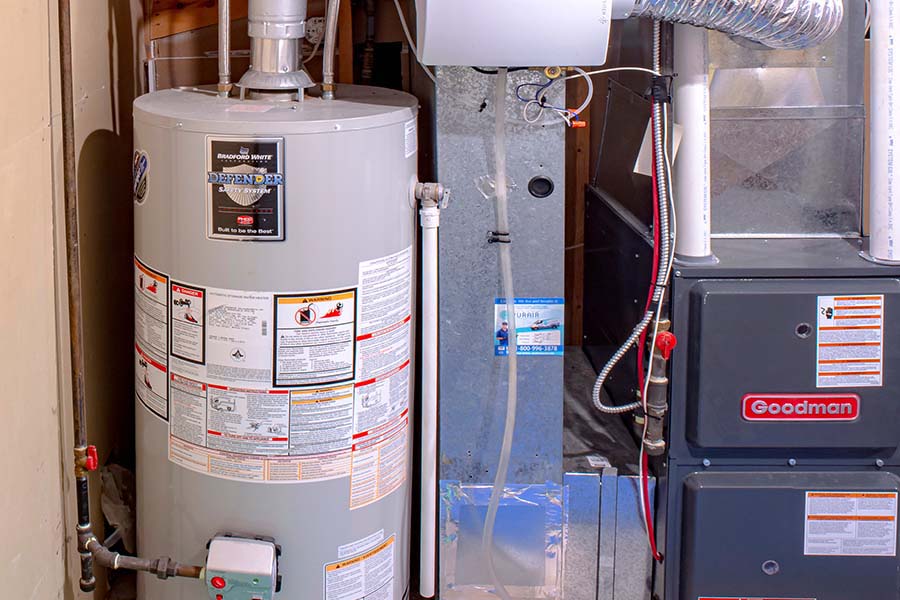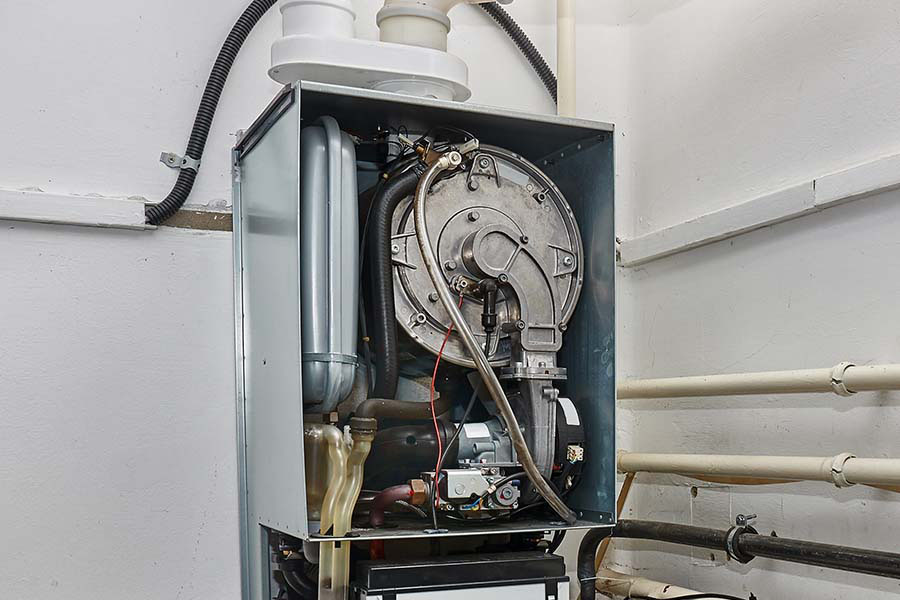When it comes to emergency boiler repair in Castlewood, CO, knowing what to do can save you time and stress. Familiarizing yourself with your boiler system and recognizing common issues is essential for every homeowner. You’ll want to be prepared for unexpected problems, and understanding safety precautions is vital. But what should you do first when something goes wrong? Let’s explore the key tips that can help you tackle boiler emergencies effectively.
Understanding Your Boiler System
Understanding your boiler system is vital, especially when emergencies strike. You need to know the components that keep your home warm and comfortable. Familiarize yourself with the boiler’s pressure gauge, which shows if the system’s pressure is too low or too high.
Locate the thermostat, as it’s important for regulating temperature. Know where the shut-off valve is; in emergencies, you might need to cut off the water or gas supply quickly. Pay attention to any unusual noises—these can signal issues before they escalate.
Regular maintenance is key; it helps you catch problems early. Also, keep an eye on your boiler’s age; older systems may not perform as well and might require more attention. Additionally, remember that expert repair services ensure efficient boiler operation, which can prevent small issues from becoming major problems.
Finally, don’t hesitate to reach out to a professional if you feel something’s off. Being proactive can save you time, money, and discomfort during a crisis.
Recognizing Common Boiler Issues
When it comes to keeping your home warm, recognizing common boiler issues can save you from costly repairs and uncomfortable situations.
Start by paying attention to unusual noises, like banging or whistling, which could indicate trapped air or sediment buildup. If you notice water leaks or puddles around your boiler, it’s a sign of a potential failure. Additionally, inconsistent heating or fluctuating temperatures often suggests a malfunctioning thermostat or circulation issue.
Don’t ignore the pressure gauge; if it’s too low or too high, your boiler may not operate efficiently. A strange smell, particularly gas, warrants immediate attention.
Also, monitor the pilot light; if it’s out, you may need to relight it or check for ventilation issues. Finally, if you’re experiencing frequent cycling on and off, your boiler may be overworked or improperly sized.
To ensure your boiler operates safely and efficiently, consider the importance of boiler installation and replacement when upgrading your heating system.
Stay vigilant, and you’ll keep your home cozy and safe.
Safety First: Precautions Before Repairs
Before you start any boiler repairs, make sure to turn off the power to prevent accidents.
It’s also essential to check for gas leaks, as safety should always come first.
Taking these steps can help you avoid potential hazards while you work on your boiler. Additionally, having routine inspections performed by certified technicians ensures that your boiler remains safe and efficient during operation.
Turn Off Power
One essential step in any emergency boiler repair is turning off the power to the unit.
Before you start any work, locate the power switch or circuit breaker associated with your boiler and turn it off. This simple action guarantees your safety and prevents any accidental electrical shocks while you’re making repairs.
If your boiler has a power cord, unplug it to eliminate any risk. Always double-check that the power is off by using a voltage tester.
Remember, even if you think the boiler’s off, it’s better to be cautious. Taking this step seriously can protect you from potential hazards and set the stage for a successful repair.
Keep safety as your top priority throughout the process.
Check for Gas Leaks
How can you guarantee your safety while working on your boiler? First, check for gas leaks before starting any repairs.
Turn off the gas supply to eliminate risks. Use a gas leak detector or soapy water on connections; bubbles indicate leaks. If you smell gas, don’t hesitate—evacuate your home immediately and call your gas company.
Always assure proper ventilation while working in confined spaces to avoid the buildup of harmful gases. Keep a fire extinguisher handy, just in case.
Tools You Might Need for Emergency Repairs
When an emergency boiler situation arises, having the right tools on hand can make all the difference. Start by gathering a basic tool kit that includes a wrench, screwdrivers, and pliers. These will help you with any loose fittings or screws that need tightening.
A multimeter is essential for checking electrical connections, ensuring everything’s running smoothly. You might also want a flashlight, as emergencies often happen when visibility is low.
Don’t forget safety gear like gloves and goggles to protect yourself while working. A bucket can catch any leaks, and duct tape can temporarily seal small cracks.
If you have a digital thermometer, it can help monitor temperatures. Finally, consider a manual for your specific boiler model; it can guide you through basic troubleshooting. Additionally, remember that regular cleaning of HVAC systems can prevent many emergencies by ensuring everything operates efficiently.
With these tools at your disposal, you’ll be better prepared to handle unexpected boiler issues.
Step-by-Step Troubleshooting Guide
Troubleshooting your boiler can seem intimidating, but breaking it down into clear steps makes the process manageable.
Start by checking the thermostat; verify it’s set to a higher temperature than the current room temperature.
Next, inspect the power supply—make sure the boiler’s plugged in and the circuit breaker hasn’t tripped.
If you hear strange noises, check for air trapped in the system by bleeding the radiators.
If the boiler’s pressure is low, you might need to add water.
Look for leaks around the unit; any signs of water could indicate a serious issue.
Finally, examine the pilot light. If it’s out, relight it according to the manufacturer’s instructions.
Following these steps can help you identify simple issues.
If problems persist, remember, it’s crucial to reach out to a professional for assistance.
When to Call a Professional
While some boiler issues can be resolved with a bit of DIY troubleshooting, there are times when it’s essential to call in a professional. If you notice unusual noises, such as banging or clanking, it’s a sign something’s wrong.
Also, if you experience inconsistent heating or rising energy bills, don’t hesitate to reach out for help. Leaks or pooling water around your boiler are red flags that require immediate attention.
Furthermore, if you’re unsure about the troubleshooting steps or lack the necessary tools, it’s best to leave it to the experts. Remember that safety is paramount—if you smell gas or notice a carbon monoxide alarm going off, evacuate your home and call emergency services right away.
Trusting a licensed professional guarantees your boiler gets the care it needs, keeping you safe and comfortable.
Importance of Regular Maintenance
Regular maintenance plays an essential role in keeping your boiler running efficiently and safely. Neglecting regular check-ups can lead to unexpected breakdowns and costly repairs.
By investing time in maintenance, you guarantee a longer lifespan for your boiler and a safer home environment.
Consider these key benefits of regular maintenance:
- Enhanced Efficiency: A well-maintained boiler uses less fuel, saving you money on energy bills.
- Extended Lifespan: Routine inspections help identify issues before they escalate, prolonging your unit’s life.
- Improved Safety: Regular checks reduce the risk of dangerous leaks and malfunctions.
- Consistent Comfort: Maintenance guarantees your home stays warm during the cold months.
- Peace of Mind: Knowing your boiler is in good shape allows you to focus on other important aspects of your home.
Don’t overlook the importance of regular maintenance—it’s your best defense against future headaches!
Signs That Indicate You Need a New Boiler
How can you tell when it’s time to invest in a new boiler? Look for several key signs that indicate your current system may be nearing its end.
If your boiler is over 15 years old, it may struggle to operate efficiently, leading to higher energy bills. Unusual noises, like banging or clunking, often signal internal issues that could mean a replacement is necessary.
Frequent breakdowns or repairs can also indicate that your boiler is failing, as constant maintenance can become more costly than a new unit.
Additionally, if you notice inconsistent heating throughout your home or cold spots, it might be time for a change.
Finally, if you spot leaks or corrosion, don’t ignore them—these are serious signs of impending failure.
Trust your instincts; if you’re experiencing any of these issues, it’s wise to consult a professional about a new boiler.
Emergency Boiler Repair Services in Castlewood
When your boiler breaks down unexpectedly, it can throw your whole household into chaos.
In Castlewood, having access to reliable emergency boiler repair services is vital for restoring comfort and safety. You don’t want to be stuck in the cold, so knowing who to call is essential.
Southwest Heating & Cooling offers 24/7 emergency service, ensuring you’re never left in the lurch.
Consider these features when seeking emergency repair services:
- Rapid response times to minimize downtime
- Licensed and certified technicians for your peace of mind
- Comprehensive diagnostic tools to pinpoint issues quickly
- Transparent pricing with no hidden fees
- Customer satisfaction guarantees for added assurance
With these qualities in mind, you’ll be well-prepared to tackle any boiler emergency that arises.
Trusting a dedicated local provider can make all the difference in your time of need.
How to Prevent Future Boiler Emergencies
Experiencing a boiler emergency can be distressing, but taking proactive steps can help you avoid future breakdowns.
Start by scheduling regular maintenance with a trusted HVAC professional like Southwest Heating & Cooling. They’ll inspect your system, clean components, and identify potential issues before they escalate.
Keep an eye on your boiler’s pressure and temperature gauges; unusual readings can signal problems.
Bleed your radiators periodically to guarantee efficient heating.
Don’t ignore strange noises or leaks—address them immediately. Additionally, replacing old parts before they fail can save you from unexpected emergencies.
Install a carbon monoxide detector near your boiler for added safety.
Finally, familiarize yourself with the manufacturer’s guidelines and always follow them.
Conclusion
In Castlewood, being prepared for boiler emergencies can save you time and money. Just like that time you found a forgotten umbrella right before the rain, knowing your boiler’s quirks can help you avoid disaster. By staying informed and keeping up with maintenance, you’ll not only extend your boiler’s life but also keep your home safe and cozy. So, next time you hear a strange noise or see a leak, you’ll be ready to take action!


